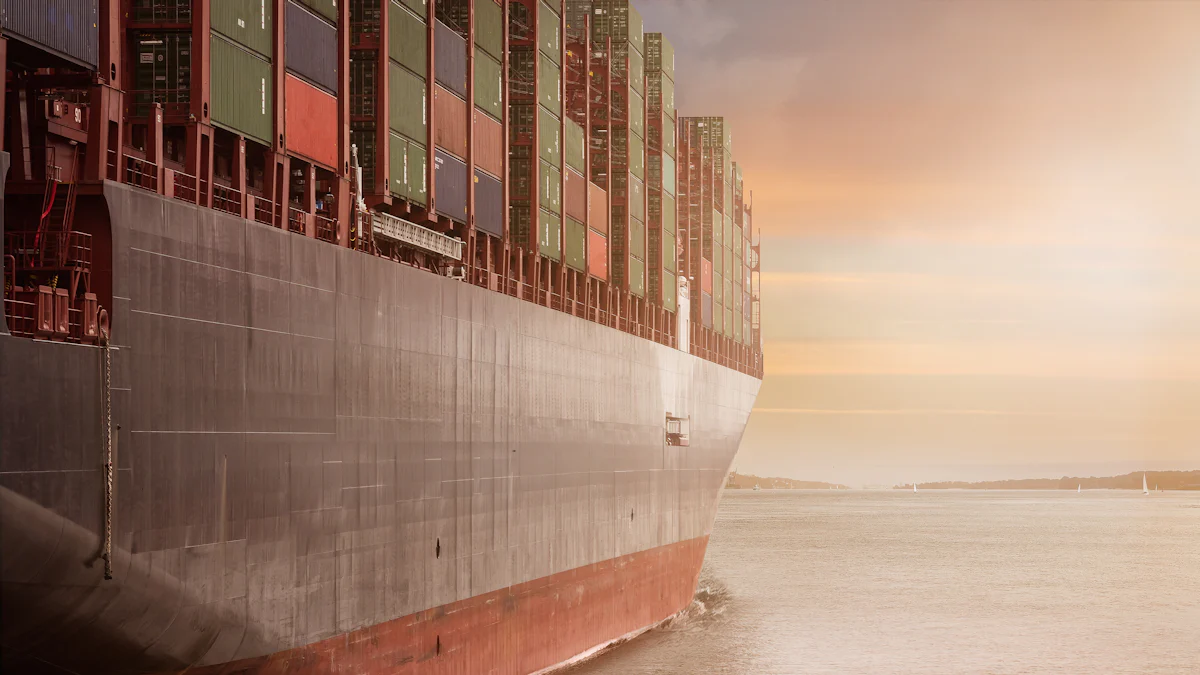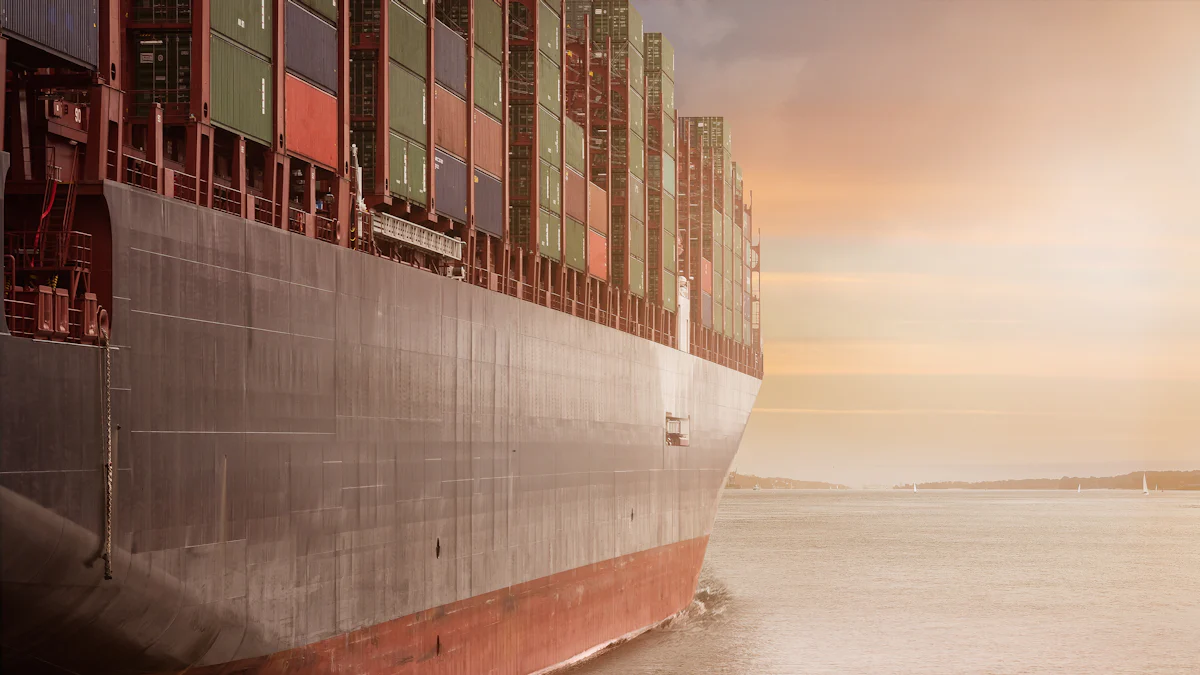Multimodal Transport: Balancing Benefits and Challenges

Multimodal transport combines two or more modes of transportation to optimize the efficiency and effectiveness of shipments. This logistics strategy opens frontiers and broadens horizons for businesses. Multimodal transport plays a crucial role in modern logistics by enhancing transportation efficiency, sustainability, and customer service. Businesses benefit from cost efficiency, reduced transit times, improved flexibility, and environmental sustainability. Balancing the benefits and challenges of multimodal transport is essential for maximizing its potential.
Advantages of Multimodal Transport
Cost Efficiency
Multimodal transport offers significant cost efficiency. Businesses experience reduced transportation costs by utilizing multiple modes of transport. This approach allows for the optimization of routes, which minimizes expenses. The integration of rail and truck services can cut transportation costs by more than half compared to using trucks alone.
Economies of scale further enhance cost efficiency in multimodal transport. Larger shipments benefit from lower per-unit costs. This advantage results from the ability to consolidate goods and maximize the use of available space. Multimodal transport typically incurs lower insurance costs due to fewer transfers and reduced risk of damage during transit.
Flexibility and Accessibility
Flexibility stands as a key advantage of multimodal transport. Diverse route options allow businesses to choose the most efficient paths for their shipments. This flexibility ensures that goods reach their destinations promptly. Multimodal transport provides door-to-door service, enhancing convenience and efficiency.
Accessibility to remote areas improves with multimodal transport. Combining different modes enables goods to reach locations that might otherwise be difficult to access. This capability broadens market reach and enhances customer satisfaction.
Environmental Benefits
Multimodal transport contributes to environmental sustainability. Lower carbon emissions result from the efficient use of various transport modes. This approach significantly reduces the carbon footprint compared to relying solely on air or ocean freight. By optimizing cost and lowering emissions, multimodal transport aligns with climate-conscious practices.
Reduced traffic congestion represents another environmental benefit. Efficient route planning and the use of rail transport help alleviate road congestion. This reduction in congestion leads to less fuel consumption and fewer emissions, promoting a cleaner environment.
Disadvantages of Multimodal Transport
Complexity in Coordination
Effective communication plays a crucial role in multimodal transport. Multiple stakeholders must communicate clearly to ensure smooth operations. Miscommunication can lead to errors and inefficiencies. Coordination requires precise information sharing among all parties involved.
Scheduling presents significant challenges in multimodal transport. Each mode of transport operates on different schedules. Aligning these schedules demands meticulous planning. Delays in one mode can disrupt the entire supply chain.
Increased Risk of Delays
Dependency on multiple modes increases the risk of delays. Each mode has its own set of potential disruptions. Weather conditions, mechanical failures, or labor strikes can affect any mode. These disruptions can cascade through the entire transport chain.
Logistical bottlenecks pose a threat to timely deliveries. Congestion at transfer points can cause significant delays. Efficient management of these bottlenecks is essential. Proper infrastructure and technology can mitigate these risks.
Higher Initial Investment
Infrastructure requirements for multimodal transport are substantial. Ports, terminals, and warehouses need significant investment. These facilities must accommodate various modes of transport. Developing this infrastructure demands time and resources.
Technology integration costs add to the initial investment. Advanced systems are necessary for tracking and coordination. These systems ensure seamless transitions between modes. Implementing such technology requires financial commitment and expertise.
Multimodal Transport Companies

Role in the Industry
Multimodal transport companies play a vital role in the logistics industry. These companies utilize multiple transportation modes to enhance efficiency and reliability. The integration of road, rail, air, and sea transport optimizes cargo movement from origin to destination. This approach allows shippers to benefit from the strengths of each mode while minimizing their limitations.
Examples of Leading Companies
Leading logistics providers have embraced multimodal transport. These companies have experienced significant benefits from this approach. Fast-boat services and optimized trucking routes have resulted in cost savings and faster delivery times. Shipments from Southeast Asia to the US have particularly benefited from these innovations.
Company Information:
DHL: DHL offers comprehensive multimodal solutions that integrate different transport modes for seamless logistics.
Maersk: Maersk provides end-to-end multimodal services, ensuring efficient cargo movement across continents.
FedEx: FedEx utilizes multimodal transport to enhance delivery speed and reliability for international shipments.
Innovations in Multimodal Solutions
Innovations in multimodal solutions continue to transform the logistics landscape. Companies invest in advanced technology to improve tracking and coordination. Real-time data analytics enhance decision-making and optimize route planning. Automation in transfer points reduces delays and increases efficiency.
Key Innovations:
Real-Time Tracking: Advanced systems provide real-time visibility into cargo movement.
Automated Transfer Points: Automation minimizes human error and speeds up cargo handling.
Data Analytics: Data-driven insights optimize route selection and reduce transit times.
Multimodal transport companies remain at the forefront of logistics innovation. Their commitment to efficiency and reliability drives continuous improvement in the industry.
Multimodal transport offers significant benefits, including cost efficiency and environmental sustainability. However, challenges like coordination complexity and initial investment remain. Strategic planning plays a crucial role in overcoming these obstacles. Effective communication and infrastructure development enhance the success of multimodal transport. The future of logistics relies on innovations in data analytics and technology integration. Multimodal transport will continue to evolve, providing efficient and sustainable solutions. Embracing these advancements ensures a robust and adaptable logistics network.
See Also
Cost-effective Transportation Management: Your Budget's Closest Ally
Ready to Explore: The Latest in Transport Tech for Supply Chains
Sustainable Transportation: The Definitive Guide for Supply Chains
Innovative Transport Solutions: Redefining Efficiency with Indigenous Intelligence
